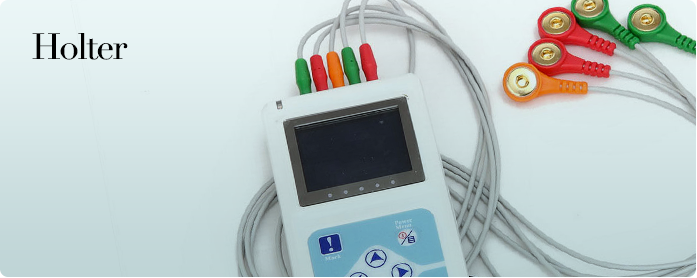| Holter test is an ambulatory ECG test used for diagnosing arrhythmias. An ambulatory test means that the patient is free to go anywhere and about his daily routine while the test is being performed. |
|
| ECG electrodes are placed on the chest, and are connected to a recorder which records the heart rate and rhythm continuously. Such recordings of the heart rhythm can be made for 24, 48 or 72 hours. Most patients tolerate wearing of the electrodes for 24 hours quite well but beyond that duration, most would find it uncomfortable as they are not allowed to shower or remove the electrodes at any time during the recording. |
|
| During the recording period, patients are asked to note down on a piece of paper, symptoms such as palpitations, dizziness or chest pain and the time at which those symptoms occurred. There is also a button on the recorder which can be pressed to indicate the exact time of the symptom. In this way, any symptom can be correlated to the heart rhythm at the time. |
|
| Holter test is often ordered in patients who complain of symptoms such as palpitations, dizziness, fainting or breathlessness. It is also performed in patients who have been noted on an ECG to have an abnormal heart rhythm or heart conduction system problem, but in whom symptoms may or may not be present. Some conditions such as Long QT Syndrome or Brugada Syndrome may show only intermittent changes on the ECG, or have asymptomatic arrhythmias which only the Holter may pick up. |
|





